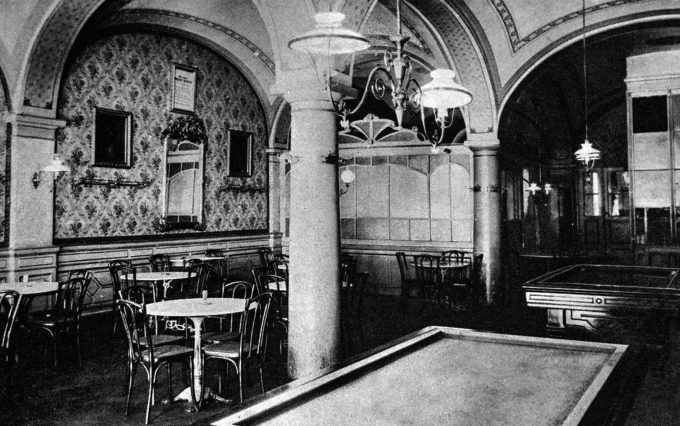
15th March 2023
Non-Fiction
8 minutes read
Café of Eternal Light
translated by Thomas Cooper

15th March 2023
8 minutes read
In 1848, all of Europe is in a fever of revolutions. One can make a cute little calendar out of them: Palermo, in Sicily, flares up in January, Paris ablaze in February, then the Grand Duchy of Baden, on 13 March, Vienna, Pest-Buda two days later (still two separate cities at the time, only officially called Budapest after their unification in 1873), three days later, Milan, but with protests also breaking out in Berlin and Venice. In April, riots break out in Krakow, Poland, and in July, an uprising in Ireland.
Hefty tomes have been written on the causes and contexts of these earthquakes, as well as the protagonists, who were rulers, statesmen, sometimes even poets and composers. But for the moment let’s just find a comfy spot in a Hungarian café and
imagine ourselves in the clouds of pipe and cigar smoke some 175 years ago.
Herrengasse, or “Lords Lane,” is an elegant spot in the center of Pest. Bright shops and lots of pedestrians and horse-drawn carriages. This is where Ferenc Privorszky opened his Renaissance café in 1837, quickly managing to make it a favorite meeting place for the intelligentsia of Pest. On the walls hang portraits of the most liberal-minded Hungarian politicians and statesmen. It was in this building that the first gas lighting flickered on in Pest, so guests could read the Hungarian, Viennese, and even French newspapers day and night. Which is why the place also came to be known as the Café of Eternal Light. The café owner was quick to inform the newspapers that his four “rococo” billiard tables were the work of a Hungarian master carpenter from Buda, not Vienna.
It’s a popular place for students, especially students of law, who feverishly read and debate the daily news and are often compelled to rely on the goodwill of Károly Pillwax, the phlegmatic headwaiter, when they need to run a tab. (Notably, Pillwax later changes his name to Pilvax, a less German, more Hungarian spelling.)
When Privorszky embarks on even more ambitious business ventures in 1843, Pillwax will take over management of the café and, at his wife’s insistence, will put his name on the sign. But like his predecessor, he too will decorate the walls with portraits of the towering figures of Hungarian history. According to foreigners who sojourned in Pest at the time, cafés in the bustling city garbed not only their waiters but also their furniture in the national colors, red, white, and green, but whether this was the case at Pillwax’s establishment we do not know. In the only reliable color picture from the time, there are people sitting in all the chairs.
Nothing, by the way, could be farther from this man’s mind than revolution. He is sickly. For some two years now, he has been struggling just to keep up with work. He will soon hand over the baton to his successor, headwaiter János Fillinger. Fillinger takes up his new role on 22 October 1847, and he makes the very wise decision to change nothing. The old name stays, the pool tables and the newspapers stay. One small change, however. The great Hungarians on the wall are joined by great Frenchmen: the greats of the revolution, as well as an engraving of the Bastille after it had been stormed by the crowd.
This is the café where a young group of people, the Society of Ten, meets on a daily basis.
The Society was founded in the spring of 1846 by Sándor Petőfi, the most important Hungarian poet of his time,
initially only with the intention of reforming literature. The youngest member of this group was 19, the oldest was 26. The large, round table in the back corner, the so-called Table of Public Opinion, becomes not their second home but their first. In one of his letters, Petőfi asks his friend and fellow poet János Arany, who lives in the countryside, not to send letters to his lodgings. “If you write,” he tells him, “you would perhaps do better to address your letters to Pillvax Café, where I can get them more easily than I could at home.”
No wonder. As is the case in other major European cities, housing conditions in Pest are terrible. Rents are high, and it is expensive to heat and provide lighting. Wives and children are home for the better part of the day, and there is an unending fugue in three voices: singing, squabbling, and screaming. Things aren’t much better out in the streets. The continuous clip-clop of horses’ hooves on the cobblestone, whips cracking on their backs, goods and materials being carted to stores and workshops, something being hammered together or sedulously erected everywhere, itinerant tradesmen and craftsmen going from building to building, bringing water from the Danube, and kindling, milk, bread, vegetables, people buying and hawking second-hand clothes, rags, plumes, whetting or mending leaky pots, playing the violin or the accordion. They all have one thing in common: they are all bellowing.







